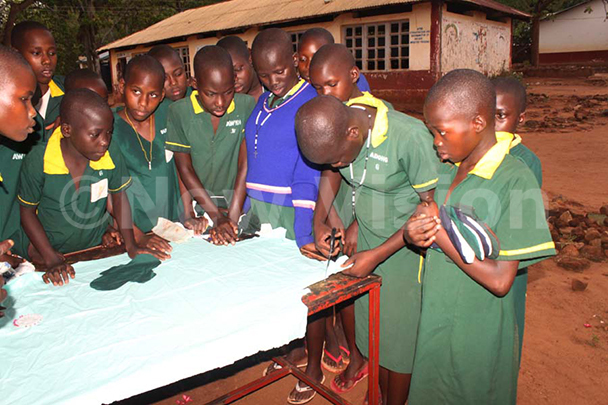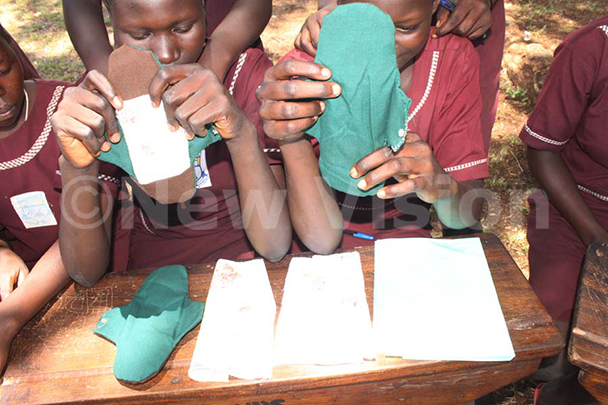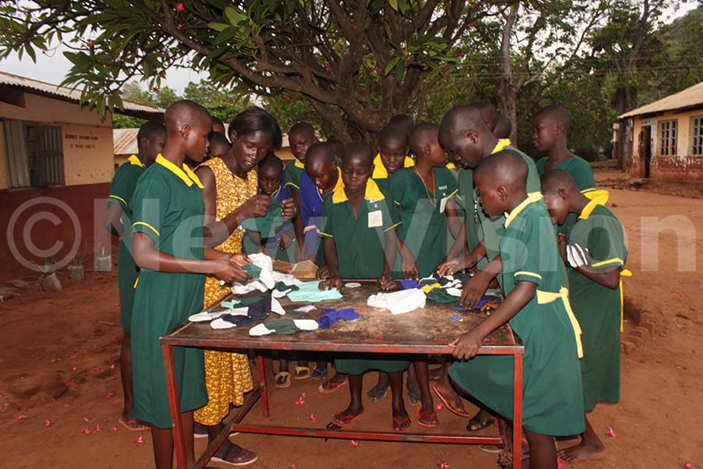Re-usable sanitary towels retain girls in schools
It was a norm in Abim district for girls to miss school when in their menstruation periods; this was because they lacked sanitary pads.
For many girls in this district, getting their first menstruation was often a trying time.
Sometimes the girls would be confused and fear to tell anyone. All they did was to stay away from school until when they were done. This in the long run this led to poor performance in schools.
Mary Atim, a teacher in one of the school recalls when one of the girls in her class glued on the floor. She was silent in that no one could guess what her problem was.
Atim later discovered her dress was all stained with blood. "With confusion on her innocent faces, she could not tell what had happened. She said it was her first experience that had caused severe back pains and stomach pains. Her mother had advised her to pile soil and sit on it the day she realized blood was coming, which she also did in the class," Mary narrates.
Atim adds that the girl revealed that her peasant mother could not afford buying for her pads but instead use sand. "It was very embarrassing to her, she never expected it to be the way it was," Atim added.

Vicky Akong a pupil at Morulem Girls Primary School, Morulem Sub County in Abim district, recalls the frustration she went through during her first mess periods. She mostly used rags which were uncomfortable to her so she preferred staying home during her period.
"I would wrap a sweater around my waist to avoid the stares whenever I got up. Boys once teased me when I had soiled my uniform, mocking me that I had slaughtered a goat. This embarrassed me very much and almost dropped out of school, thanks to our senior woman teacher who always provided clean pieces of clothes that we used as pads," Akong narrates.
In most parts of Karamoja, menstruation is discussed in silent tones. Unfortunately, the ripple effect is that young girls like Akong and many others risk dropping out of school.
To keep the girls in school, World Vision under their project Girl's Education Movement (GEM), invented a cheap way of making reusable sanitary pads for the girls using locally available materials in six schools that include; Otalabar Primary School, Kanu Primary School, Rackoko Primary School, Aninata Primary School, Morulem Girls Primary School and Akwangagwel Primary School.
James Okot Ochaya, Project Manager at World Vision Abim says, in their survey, it was discovered that girls enrollment in most primary schools was very poor compared to boys and menstruation was aired out as the leading cause.
Quinjo Ojok the patron GEM club at Kanu primary school says, menstruation is treated with silence and as a taboo topic in Karamoja, with menstrual blood viewed as unclean and harmful, this limits women's and adolescent girls' access to relevant and important information about their bodies.
He explains that traditionally, in Abim, advice on women changes was by aunts and grandmothers; this was because these women are considered wise however these women are often illiterates so all they do is to recount and reinforce myths that are biologically incorrect.

Ochaya also discovered that when girls in Abim started experiencing their monthly cycles, they tended to keep away from school. Parental support towards girls during monthly cycles was also minimal.
"Very few appreciated and in effect could buy modern sanitary pads that cost between sh2500 and sh3000 to enable their girl be at school and compete favorably with the boys a factor that contributed to the poor performance especially amongst girls. When we introduced reusable sanitary pads, things greatly changed," Ochaya explains.
Margie Adonga Mabele senior woman teacher and patron GEM club at Otalabar Primary School describes the process of making reusable pads as one of the easiest.
She explains that the pads are made using cotton material, with a polythane paper that is inserted in the middle of the cloth, after it is sawn locally with a needle and threads, before putting press buttons that are used for hold the pad on the nicker.
The pad has a part called a hot zone which absorbs blood, and then the pockets were the hot zone is inserted leaving the middle white zone exposed. The pocket also have wings were the press buttons are fitted and they are used to hold the pad on the nickers.
"The pad is made using soft materials that is why they are very comfortable when the girls a using them. They have no chemicals added to preserve them. It is just natural material," Ochaya explains.
He adds that a meter for the cotton material is sh8, 000, and a role of polyester used to make the pockets is about sh370, 000. A meter of polythene is sh7, 000 and all the materials. We give them the technical support and the rest are by parents and the school.
Adonga explains that the pad is made in such a way that when it if full, it is removed it very carefully, and after socked and washed with clean water. Then they are hanged in the sun. The pad is also supposed to be ironed to kill all bacteria that could have been contracted while washing.
"All what the girls need are four pieces of reusable pads for a full year. The pads are very health if the user follows the right procedures. We always teach the girls to keep the pads very clean," she explains.
She also says that the pads have improved on the retention process of the girls in the school, "We could have at least two to five girls absenting themselves for at least four days. No teacher has time to repeat for absentees. This meant that catching up would be very hard for these girls. Today there is no excuse, the pads are provided free to all girls and they are available," Aguti explains.
"Girls now can make pads themselves, some have introduced the project to their parents who are making big money from them," she stresses.
Proscovia Apio a primary seven pupil says, after learning how to make reusable pads, she introduced the idea to her mother who is a tailor in one of the trading center in Abim town, and she says that her mother now makes them for sale.
"People always come and buy each at Shs2000, this money my mother uses to buy scholastic materials for me and my three brothers," Apio explains.
Ochaya says, over 87530 senior woman teachers and 114 Education activists have been trained in making reusable sanitary pads and so far over 2500 pads have been made by the girls across the target schools. The project also supports infrastructural developments within target schools such as construction of class rooms, dormitories, staff houses and VIP Latrines.
Michael Achilla, the head teacher Kanu primary school says that the reusable sanitary pads have greatly improved the girl's attendance in school. Many people were unable to buy for their girl's pads, and this forced many out of school until they were through with their periods.
However today they can make them at school and there is no need to disturb their parents again. "The performance of the girls in school is improving from the previous years were it was hard to get girls get even 3rd grade in their final exams, last year many got even second grade and one got a first grade in primary seven.
At least 500 million girls and women globally lack adequate facilities for managing their periods, according to a 2015 report from UNICEF and the World Health Organization (WHO).
Reports estimated that there were four million girls said to be in school today and that if one million of them have started their periods, yet 75% of the country's population lives in the rural areas, where menstruation is never freely talked about, then annually 750 girls might be contemplating dropping out of school.
And that on average, the report revealed that of the 80 days allocated to a school term, 29.7% of the adolescent girls said they miss a minimum of four days per cycle. This also includes examination days, important class presentations and the introduction of new topics.
UNESCO estimates that one in 10 African adolescent girls in remote areas misses school during their periods and eventually drops out because of menstruation related issues. Research shows that many girls in Karamoja areas miss 4-5 days of their school time every month during their monthly periods, and this due to lack of sanitary towels.
